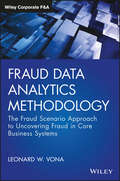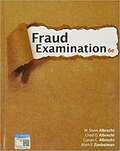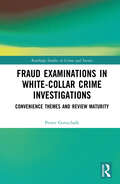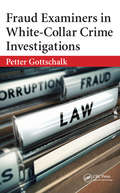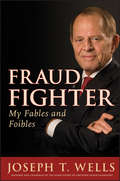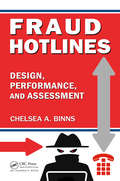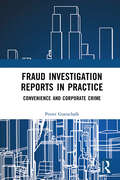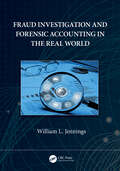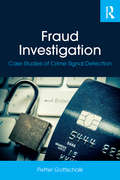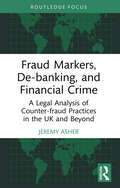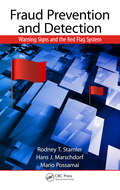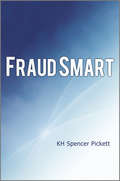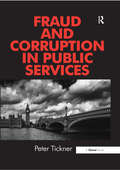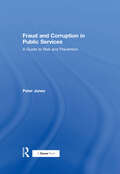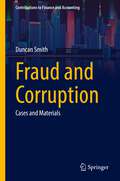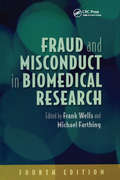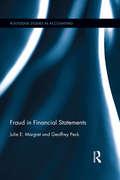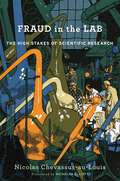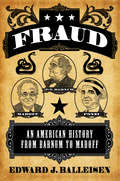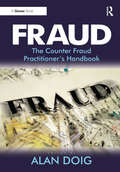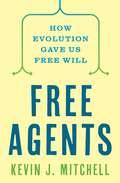- Table View
- List View
Fraud Data Analytics Methodology: The Fraud Scenario Approach to Uncovering Fraud in Core Business Systems (Wiley Corporate F&A)
by Leonard W. VonaUncover hidden fraud and red flags using efficient data analytics Fraud Data Analytics Methodology addresses the need for clear, reliable fraud detection with a solid framework for a robust data analytic plan. By combining fraud risk assessment and fraud data analytics, you'll be able to better identify and respond to the risk of fraud in your audits. Proven techniques help you identify signs of fraud hidden deep within company databases, and strategic guidance demonstrates how to build data interrogation search routines into your fraud risk assessment to locate red flags and fraudulent transactions. These methodologies require no advanced software skills, and are easily implemented and integrated into any existing audit program. Professional standards now require all audits to include data analytics, and this informative guide shows you how to leverage this critical tool for recognizing fraud in today's core business systems. Fraud cannot be detected through audit unless the sample contains a fraudulent transaction. This book explores methodologies that allow you to locate transactions that should undergo audit testing. Locate hidden signs of fraud Build a holistic fraud data analytic plan Identify red flags that lead to fraudulent transactions Build efficient data interrogation into your audit plan Incorporating data analytics into your audit program is not about reinventing the wheel. A good auditor must make use of every tool available, and recent advances in analytics have made it accessible to everyone, at any level of IT proficiency. When the old methods are no longer sufficient, new tools are often the boost that brings exceptional results. Fraud Data Analytics Methodology gets you up to speed, with a brand new tool box for fraud detection.
Fraud Examination (Mindtap Course List)
by W. Steve Albrecht Chad O. Albrecht Conan C. Albrecht Mark F. ZimbelmanLearn to identify, detect, investigate and prevent financial fraud today with the latest edition of Albrecht/Albrecht/Albrecht/Zimbelman's FRAUD EXAMINATION, 6E. Develop fraud skills as you become a better interviewer, stronger and more skeptical document examiner, better technology user and more informed decision maker. Closely examine and gain a strong understanding of the types of fraud and nature of fraud investigation today with current business examples and numerous actual fraud cases, delivered first-hand from the authors' experience. FRAUD EXAMINATION presents today's most important fraud concepts with an emphasis on the growing areas of ebusiness and cyber fraud. Significant discussion familiarizes you with forensic analysis as well as legal options for victims of fraud. New discussion also highlights how experts use technology to accomplish fraud and detect fraud.
Fraud Examinations in White-Collar Crime Investigations: Convenience Themes and Review Maturity (Routledge Studies in Crime and Society)
by Petter GottschalkThis book reviews a range of reports written by fraud examiners after completing internal investigations. These reports are normally kept secret and are the property of client organizations, which do not wish to disclose potential wrongdoing that can harm the reputation of the businesses. Fraud Examinations in White-Collar Crime Investigations was able to retrieve several recent reports, including foreign aid kickbacks, Russian favors to the Biathlon president, and Leon Black’s deals with Jeffrey Epstein. While not claiming that the obtained reports are representative for the outcome of the private investigation industry, the reports do provide insights into the variety of issues that fraud examiners address in their internal investigations and the quality of their work. This book identifies convenience themes and assesses investigation maturity across the reports analyzed. It considers the motives of and opportunities for white-collar criminals, as well as their willingness to engage in unlawful activity, and assesses to what extent fraud examiners are either efficient or deficient in their work. A compelling read, this book will appeal to students and scholars of criminology, sociology, law, and politics, and all those interested in fraud examinations in relation to white-collar crime.
Fraud Examiners in White-Collar Crime Investigations
by Petter GottschalkIn Fraud Examiners in White-Collar Crime Investigations, Petter Gottschalk examines and evaluates the investigative processes used to combat white-collar crime. He also presents a general theory regarding the economic, organizational, and behavioral dimensions of its perpetrators.Pool Your Resources for a Successful InvestigationGottschalk emphasiz
Fraud Fighter
by Joseph T. WellsA collection of insightful, poignant, and humorous stories from Dr. Joseph Wells, the world's foremost fraud expert?with gutsy revelations of his own past mistakes From his dysfunctional childhood in rural Oklahoma; his service in the U. S. Navy; a brief stint in public accounting followed by a career in the FBI; and founding the world's largest anti-fraud organization, Wells' colorful life experiences were preparation for his rise to one of the globe's most revered antifraud experts. Written by the preeminent antifraud authority and founder and Chairman of the ACFE Offers a fascinating behind-the-scenes look at the life of one of the most influential white-collar crime experts of our time At a period when dishonesty at top U. S. companies is dominating public attention, The Fables and Foibles of a Fraud Fighter is a surprisingly frank and gripping memoir from an unsurprisingly effective fraud fighter. This autobiography forms a full tapestry of a life, displaying wit, intrigue, trepidation, regret, and finally, ultimate victory.
Fraud Hotlines: Design, Performance, and Assessment
by Chelsea A. BinnsThis book provides a complete guide on fraud hotlines. It is designed to educate readers with respect to the history, purpose, operation, use and utility of fraud hotlines. It also equips readers with the knowledge to create, analyze and assess the performance of fraud hotlines.
Fraud Investigation Reports in Practice: Convenience and Corporate Crime
by Petter GottschalkInvestigation reports are written by fraud examiners after completion of internal reviews in client organizations when there was suspicion of financial wrongdoing. Fraud examiners are expected to answer questions regarding what happened, when it happened, how it happened, and why. This book presents a number of case studies of investigation reports by fraud examiners, offering a framework for studying the report as well as insights into convenience of fraud. The case studies, including KPMG and PwC, focus on two important subjects. First, convenience themes are identified for each case. Themes derive from the theory of convenience, where fraud is a result of financial motives, organizational opportunities, and personal willingness for deviant behaviors. Second, review maturity is identified for each case. Review maturity derives from a stages-of-growth model, where the investigation is assigned a level of maturity based on explicit criteria. The book provides useful insights towards approaching fraud examinations to enable better understanding of the rational explanations for corporate fraud. The book is framed from the perspective of private policing, which contextualizes how investigation reports are examined. This book is a valuable resource for scholars and upper-level students researching and studying auditing and investigation work in the corporate and public sectors. Business and management as well as criminal justice scholars and students will learn from the case studies how to frame a white-collar crime incident by application of convenience theory and how to evaluate a completed internal investigation by fraud examiners.
Fraud Investigation and Forensic Accounting in the Real World
by William L. JenningsThis book covers every aspect of forensic accounting, anti-fraud control systems, and fraud investigations. The author uses his own case experience to guide the reader through each phase of a forensic accounting assignment and fraud investigation. The book opens with an explanation of what happened to a company that was ensnared in a huge commodity purchasing scheme. Using his knowledge and experience gained over 40 years, the author illustrates that unexpected fraud occurrences can happen to any company, in any industry. Additionally, the author explains the current white-collar crime threats that organizations face every day, as well as legal issues that are often implicated in forensic accounting and fraud investigation projects. Electronic and non-electronic evidence gathering is also covered in detail with illustrative examples. One chapter is devoted entirely to the often misunderstood, but extremely important, subject of witness interviews. It provides the correct approach to the analysis and correlation of evidence in determining findings and conclusions of an investigation. Another chapter is devoted to proper report writing. The author provides detailed guidance on presenting findings to a variety of audiences, including management, a board, law enforcement, and at trials and hearings. It also covers proper techniques for measuring economic damages and concludes with a useful index. William L. Jennings is a Senior Director at Delta Consulting Group. He is responsible for providing forensic accounting, investigation, and asset recovery services to corporations, government agencies, attorneys, and their clients, as well as business controls consulting services to organizations. With more than 40 years of experience in public accounting and auditing, forensic accounting, business valuation, investigation, asset recovery, and business controls development, Mr. Jennings has worked on hundreds of forensic accounting and investigation assignments and he provides expert testimony.
Fraud Investigation: Case Studies of Crime Signal Detection
by Petter GottschalkInvestigating white-collar crime is like any other investigation concerned with past events. However, a number of characteristics require a contingent approach to these investigations. This book describes the process of conducting private internal investigations by fraud examiners and presents a number of reports from the United States, Sweden and Norway. It evaluates a number of internal investigation reports to reflect on the practice of fraud examinations. Empirical studies provide a basis to reflect theoretically on practice improvements for fraud examiners. Rather than presenting normative recommendations based on ideal or stereotype situations so often found in existing books, this book develops guidelines based on empirical study of current practice. Internal investigations should uncover the truth about misconduct or crime without damaging the reputation of innocent employees. Typical elements of an inquiry include collection and examination of written and recorded evidence, interviews with suspects and witnesses, data in computer systems, and network forensics. Internal inquiries may take many forms, depending upon the nature of the conduct at issue and the scope of the investigation. There should be recognition at the outset of any investigation that certain materials prepared during the course of the investigation may eventually be subject to disclosure to law enforcement authorities or other third parties. The entire investigation should be conducted with an eye towards preparing a final report. As evidenced in this book, private fraud examiners take on complicated roles in private internal investigations and often fail in their struggle to reconstruct the past in objective ways characterized by integrity and accountability.
Fraud Markers, De-banking, and Financial Crime: A Legal Analysis of Counter-fraud Practices in the UK and Beyond (The Law of Financial Crime)
by Jeremy AsherThis book enlightens the reader as to how the financial sector in the UK operates fraud databases to help combat fraud and explains the phenomenon of ‘debanking’. It considers the unique confluence of necessity, a flexible regulatory framework, and recent history of collaboration that now places fraud databases and data-sharing at the heart of the UK’s multi-agency counter-fraud strategy. It offers a practical slant to the theory behind the secretive counter-fraud and money-laundering investigation techniques, technology, and practices employed by financial organisations to disrupt fraud and money laundering. The work explains how and why the UK leads the world in this field, what progress is being made internationally to replicate these systems, and the legislative hurdles that need to be overcome to enable the level of data sharing required to make fraud databases operationally successful. It also explores the worrying trends and practices in the systems used which have adversely impacted on both innocent parties and the victims of fraud. Drawing on real-life examples, the book explores the benefits of transparency and whether the databases and the organisations that utilise them can better build fairness into their systems. It will be an invaluable resource for researchers, practitioners and policy-makers working in the areas of counter-fraud and anti-money laundering.
Fraud Prevention and Detection: Warning Signs and the Red Flag System
by Mario Possamai Rodney T. Stamler Hans J. MarschdorfMost fraud cases could have been prevented or detected earlier if early warning signs had been taken seriously. This volume enables officers and directors to protect themselves and their entities against fraud by effectively detecting, analyzing, and acting before any damage can be done. Based on an empirically tested strategy, the book teaches readers how to find Red Flag indicators of fraud or suspicious transactions in financial statements, budgets, and contracts and know how to ensure that, once a Red Flag has been identified, appropriate action is taken.
Fraud Smart
by K. H. PickettA professional guide to developing training for fraud risk and detectionThis book provides a simple but effective method of developing a fraud risk awareness strategy that focuses on training employees using a six-stage approach to this task that involves understanding the threat, appreciating respective responsibilities, embracing a sound moral compass, recognizing red flags, mastering suitable internal controls, and managing the risk of fraud. Using this step-by-step approach, all senior executives, managers, employees, and associates can develop an important new skill set that will help them understand and deal with the risk of fraud in the workplace.
Fraud and Corruption in Public Services: A Guide To Risk And Prevention
by Peter TicknerFraud, corruption and bribery in and around public services have become an increasing concern in recent years. The reported level of fraud and corruption affecting the public sector has remained unacceptably high despite numerous national and international initiatives intended to tackle these crimes and their consequences. Fraud and Corruption in Public Services is a definitive, practical guide to the diverse risks that arise in central and local government. There is guidance on civil and criminal law around fraud, bribery and corruption as well as the national and international governmental measures and initiatives for countering this form of criminality. Most importantly of all, the book offers advice, practical examples and strategies for preventing and combating fraud, bribery and corruption. The text is readable, well-informed and intensely practical; illustrated throughout with real-life examples from the author's 40 year career.
Fraud and Corruption in Public Services: A Guide to Risk and Prevention
by Peter JonesFraud, corruption and bribery in and around public services have become an increasing concern in recent years. The reported level of fraud and corruption affecting the public sector has remained unacceptably high despite numerous national and international initiatives intended to tackle these crimes and their consequences. Fraud and Corruption in Public Services is a definitive, practical guide to the diverse risks that arise in central and local government. There is guidance on civil and criminal law around fraud, bribery and corruption as well as the national and international governmental measures and initiatives for countering this form of criminality. Most importantly of all, the book offers advice, practical examples and strategies for preventing and combating fraud, bribery and corruption. The text is readable, well-informed and intensely practical; illustrated throughout with real-life examples from the author's 40 year career.
Fraud and Corruption: Cases and Materials (Contributions to Finance and Accounting)
by Duncan SmithThis book discusses and analyses fraud and corruption cases from many industries including construction, finance, pharmaceutical, transport, retail, medical, health, communication, education and military.The book is divided into two sections. The first part presents case studies that cover several industry sectors, including not only well-known frauds like Bernie Madoff, Wells Fargo and the Enron case, but also recent events such as the Theranos/Elisabeth Holmes case. The second section of the book includes materials on fraud and corruption such as the full text of the United Nations Convention Against Corruption, the OECD Convention on Combating Bribery of Foreign Public Officials in International Business, and the EIB’s Anti-Fraud Policy and Whistleblowing Policy. It also includes examples about current corporate anti-corruption policies from companies like Apple, Tesla and Coca Cola. For interested readers, the book offers additionally a list of films that realistically cover the topics fraud, corruption and whistleblowing.
Fraud and Misconduct in Biomedical Research, 4th edition
by Frank Wells Michael FarthingNow in its fourth edition, Fraud and Misconduct in Biomedical Research boasts an impressive list of contributors from around the globe and introduces a new focus for the book, transforming it from a series of monographs into a publication that will quickly become an essential textbook on all areas of research fraud and misconduct.Key features inclu
Fraud in Financial Statements (Routledge Studies in Accounting)
by Julie E. Margret Geoffrey PeckAs the monetary cost of fraud escalates globally, and the ensuing confidence in financial markets deteriorates, the international demand for quality in financial statements intensifies. But what constitutes quality in financial statements? This book examines financial statement fraud, a topical and increasingly challenging area for financial accounting, business, and the law. Evidence shows that accounting anomalies in an organization’s financial statements diminish the quality and serviceability of financial information. However, an anomaly does not necessarily signal fraud. Financial statement fraud is intended to mislead shareholders and other stakeholders. In this book, elements that underpin diversity of accounting anomalies likely found in fraudulent financial accounting statements are revealed. Multiple research methods are used in the analysis of selected international fraud cases, each illustrating examples of financial statement fraud, including: revenue recognition, overstatement and/or misappropriation of assets, understatement of expenses and liabilities, disclosure fraud, bribery and corruption. Additionally, the phoenix phenomenon with regard to fraud in financial accounting is investigated. Drawing on documented observations of commercial and legal cases globally this study highlights the necessity for continued development of financial audit practices and other audit services.
Fraud in the Lab: The High Stakes of Scientific Research
by Nicolas Chevassus-au-LouisFrom manipulated results and fake data to retouched illustrations and plagiarism, cases of scientific fraud have skyrocketed in the past two decades. In a damning exposé, Nicolas Chevassus-au-Louis details the circumstances enabling the decline in scientific standards and highlights efforts to curtail future misconduct.
Fraud: An American History from Barnum to Madoff
by Edward J. BalleisenThe United States has always proved an inviting home for boosters, sharp dealers, and outright swindlers. Worship of entrepreneurial freedom has complicated the task of distinguishing aggressive salesmanship from unacceptable deceit, especially on the frontiers of innovation. At the same time, competitive pressures have often nudged respectable firms to embrace deception. As a result, fraud has been a key feature of American business since its beginnings. In this sweeping narrative, Edward Balleisen traces the history of fraud in America—and the evolving efforts to combat it—from the age of P. T. Barnum through the eras of Charles Ponzi and Bernie Madoff. Starting with an early nineteenth-century American legal world of "buyer beware," this unprecedented account describes the slow, piecemeal construction of modern regulatory institutions to protect consumers and investors, from the Gilded Age through the New Deal and the Great Society. It concludes with the more recent era of deregulation, which has brought with it a spate of costly frauds, including the savings and loan crisis, corporate accounting scandals, and the recent mortgage-marketing debacle. By tracing how Americans have struggled to foster a vibrant economy without enabling a corrosive level of fraud, this book reminds us that American capitalism rests on an uneasy foundation of social trust.
Fraud: The Counter Fraud Practitioner's Handbook (Crime And Society Ser.)
by Alan DoigFraud: The Counter Fraud Practitioner's Handbook looks at fraud investigation methods and explores the practical options for preventing and remedying fraud. An effective fraud and financial crime strategy involves intelligence and prevention, criminal and civil legal procedures, and asset recovery, all of which may involve investigators, internal auditors, security managers, in-house and external legal counsel and advisors. Your strategy depends on the outcomes you are seeking, the nature of the fraud or crime committed and the countries involved. Fraud provides a clear picture of the role of compliance, civil and criminal legal process in any fraud strategy. Chapters then cover investigation strategies for each of the following types of fraud: benefit, health, procurement, employee, telecoms, fiscal, corporate, charity, legal and accounting. Part Three explores the practical options for fraud prevention and remediation, including both civil and criminal asset recovery. This is an essential reference for both public and private sector fraud and security specialists who need to understand the strengths and weaknesses of each element of their organization's strategy against fraud and are seeking to learn from the approach of their colleagues in other industries or organizations. Written by and for practitioners, it is a handbook that deals with the knowledge, detail and the craft that underpins all effective anti-fraud work.
Fraudulent Evidence Before Public International Tribunals
by W. Michael Reisman Christina Parajon SkinnerDomestic lawyers are, above all, officers of the court. By contrast, the public international lawyer representing states before international tribunals is torn between loyalties to the state and loyalties to international law. As the stakes increase for the state concerned, the tension between these loyalties can become acute and lead to practices that would be condemned in developed national legal systems but have hitherto been ignored by international tribunals in international legal scholarship. They are the 'dirty stories' of international law. This detailed and contextually sensitive presentation of eight important cases before a variety of public international tribunals dissects some of the reasons for the resort to fraudulent evidence in international litigation and the profession's baffling reaction. Fraudulent evidence is resorted to out of greed, moral mediocrity or inherent dishonesty. In public international litigation, by contrast, the reasons are often more complex, with roots in the dynamics of international politics.
Frauen und Verhandlungserfolg: Eine Einführung In Female Negotiation Strategies (Essentials)
by Julia Sophia HabbeTäglich muss jeder von uns verhandeln. Dabei macht es einen Unterschied, ob Männer oder Frauen dies tun. So neigen Frauen dazu, sich mit schlechteren Ergebnissen zufrieden zu geben als Männer. Nach der Forschung lässt sich das mit dem gesellschaftlichen Rollenbild erklären. Wenn Frauen in Konflikten „tough“ auftreten, fürchten sie, ihrem Rollenbild nicht zu entsprechen und negative Gegenreaktionen – zum Beispiel in Form von Sympathieverlust – hervorzurufen (so genannter Backlash-Effekt). Welchen Ausweg gibt es? Dieser Frage geht die genderspezifische Verhandlungsforschung nach. Die Forschungsergebnisse werden in dem vorliegenden essential so vorgestellt, dass sie von jeder Leserin in einer Verhandlungssituation genutzt werden können.Die Autorin Dr. Julia Sophia Habbe ist spezialisiert auf Konfliktlösung, Prozessführung sowie interne Untersuchungen. Sie ist Partnerin einer internationalen Wirtschaftskanzlei in Frankfurt am Main und Lehrbeauftragte der Johann Wolfgang Goethe-Universität im Bereich genderspezifische Verhandlungsführung.
Fred & Rose: The Full Story of Fred and Rose West and the Gloucester House of Horrors
by Howard SounesFRED & ROSE IS THE DEFINITIVE ACCOUNT OF THIS INFAMOUS TRUE CRIME CASE - NOW UPDATED WITH A POSTSCRIPT FROM THE AUTHOR. AS FEATURED ON TV, AND IN THE PODCAST SERIES, UNHEARD: THE FRED & ROSE WEST TAPESFred and Rose West are virtually unique in British criminal history: a husband and wife who loved and killed together.During their long relationship, the Wests murdered a series of young women, burying the remains of nine victims under their home at 25 Cromwell Street, Gloucester, including those of their daughter. What was left of Fred West's eight-year-old stepdaughter was dug up from under the Wests' previous Gloucester home; his first wife and nanny were buried in open country. Most victims had been decapitated and dismembered, their remains showing signs of sexual torture. These twelve are just the ones police found when the Wests were arrested in 1994. There may be more whose bones have not been located . . . Howard Sounes broke the first major story about the Wests as a journalist, and covered the murder trial of Rosemary West, before writing Fred & Rose, the definitive account of this infamous case. Beginning with Fred's and Rose's bizarre childhoods, Sounes charts their lives and crimes in forensic detail, creating a fascinating and truly frightening account of a marriage soaked in blood.
Fred & Rose: The Full Story of Fred and Rose West and the Gloucester House of Horrors
by Howard SounesFRED & ROSE IS THE DEFINITIVE ACCOUNT OF THIS INFAMOUS TRUE CRIME CASE - NOW UPDATED WITH A POSTSCRIPT FROM THE AUTHOR. AS FEATURED ON TV, AND IN THE PODCAST SERIES, UNHEARD: THE FRED & ROSE WEST TAPESFred and Rose West are virtually unique in British criminal history: a husband and wife who loved and killed together.During their long relationship, the Wests murdered a series of young women, burying the remains of nine victims under their home at 25 Cromwell Street, Gloucester, including those of their daughter. What was left of Fred West's eight-year-old stepdaughter was dug up from under the Wests' previous Gloucester home; his first wife and nanny were buried in open country. Most victims had been decapitated and dismembered, their remains showing signs of sexual torture. These twelve are just the ones police found when the Wests were arrested in 1994. There may be more whose bones have not been located . . . Howard Sounes broke the first major story about the Wests as a journalist, and covered the murder trial of Rosemary West, before writing Fred & Rose, the definitive account of this infamous case. Beginning with Fred's and Rose's bizarre childhoods, Sounes charts their lives and crimes in forensic detail, creating a fascinating and truly frightening account of a marriage soaked in blood.
Free Agents: How Evolution Gave Us Free Will
by Kevin J. MitchellAn evolutionary case for the existence of free willScientists are learning more and more about how brain activity controls behavior and how neural circuits weigh alternatives and initiate actions. As we probe ever deeper into the mechanics of decision making, many conclude that agency—or free will—is an illusion. In Free Agents, leading neuroscientist Kevin Mitchell presents a wealth of evidence to the contrary, arguing that we are not mere machines responding to physical forces but agents acting with purpose.Traversing billions of years of evolution, Mitchell tells the remarkable story of how living beings capable of choice arose from lifeless matter. He explains how the emergence of nervous systems provided a means to learn about the world, granting sentient animals the capacity to model, predict, and simulate. Mitchell reveals how these faculties reached their peak in humans with our abilities to imagine and to be introspective, to reason in the moment, and to shape our possible futures through the exercise of our individual agency. Mitchell&’s argument has important implications—for how we understand decision making, for how our individual agency can be enhanced or infringed, for how we think about collective agency in the face of global crises, and for how we consider the limitations and future of artificial intelligence.An astonishing journey of discovery, Free Agents offers a new framework for understanding how, across a billion years of Earth history, life evolved the power to choose, and why it matters.
